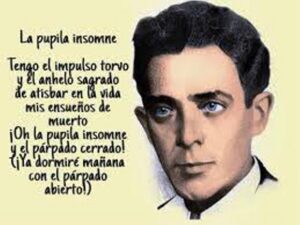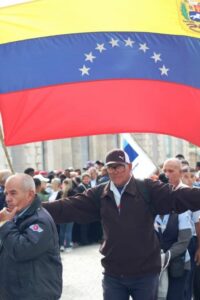«… the second city that I keep in my feelings as my mother is Matanzas»..
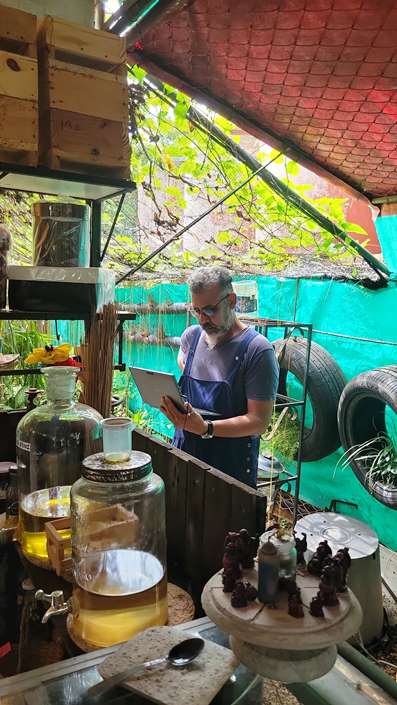
Anything I could have imagined collapsed the first time I spoke with Juan Antonio Almeida Beauballet. My interlocutor was a simple person, extremely sincere, approachable.
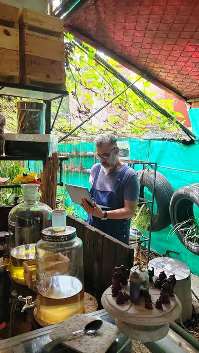
AT FIRST I agreed to the suggestion of an interview in order to please the person who asked me to do so. Afterwards, I was assailed by the curiosity of exchanging with someone who had lived constantly on the move, guarded, so to speak, by escorts and under the gaze and love of someone with his time and life totally committed to the Revolution.
Anything I could have imagined collapsed the first time I spoke with Juan Antonio Almeida Beauballet. My interlocutor was a simple person, extremely sincere, approachable. He willingly consented to talk about his connection with Matanzas, to share anecdotes of his life, to talk about his current work in a cooperative…, an exchange in which the figure of his father constantly surfaced.
I was amazed by his good writing and language, which proved to me what I already knew: that, like many Almeida, he had the artistic and intellectual gift inherited from his great-grandfather Salvador.
«I could say that I am from Cuba, because I rolled around the country as a nomad, as much as my father, who was born like me in Havana, although he felt he was from Santiago. Following him and his work, I lived in several provinces: Santiago, Bayamo, Holguin, until we returned to Havana. Like a snail with the house on its back.
«I lived alone with my father most of my childhood. In spite of being a magnificent father, he was intransigent with wrongdoing, not so much with me because of my young age, but yes, with his attitude he made his disagreement clear when I did something wrong. A look, a gesture of displeasure, although not disrespectful, managed to bring me back to sanity without much effort.
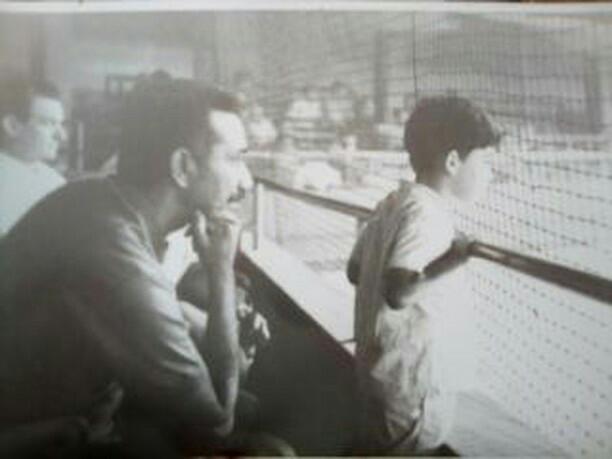
«His occupations kept him away most of the day, as was logical, but he always tried to be present at mealtime, bedtime and, many times, at breakfast, important moments in the life of any minor, except when he was traveling and could not take me with him, which was on very few occasions.»
This is how Juan Antonio remembers the time when they lived in Santiago de Cuba, when the Commander of the Revolution Juan Almeida Bosque, his father, was the member of the Political Bureau in charge of the Oriente province. Until they returned to Havana and the young man began his high school studies.
«I already felt the desire to be older and independent. I don’t know what led me to dispense with transportation and escort; maybe because I wanted to be like the others, like those boys who went to school alone, who rode buses and ‘mataperre’ in the streets. I asked for it and then my father agreed, allowing me to spend the week at my maternal grandmother’s house in Marianao, while I studied at the Alejandro García Caturla Conservatory of Music, very close to Tropicana and the Salón Mambí».
The first reason to interview Juan Antonio was his relationship with Matanzas, where he studied and discovered love, a city to which he still feels somehow linked. And that was the second surprise, to hear what he said and felt for my piece of seafaring land, which, I confess, exalted my regionalist pride of being born in Matanzas.
When he finished ninth grade, he decided to continue his studies in a military institution. He began pre-university studies at the Navy School in Havana.
«But I failed the first year. And that’s when it happened: the decision was for me to enter the Camilo Cienfuegos Military School in Matanzas, under the strict supervision of my uncle Federico. I was no longer out of my depth; I had to redeem my attitudes and behave up to par».
In 1983 Juan Antonio arrived at the Camilo Cienfuegos Military School in Matanzas.
«I spent the three years of pre-university in Matanzas. I say that the second city that I keep in my feelings as my mother is Matanzas; the first, Santiago, for all the things in which this province influenced my emotional development. For Havana I feel something special, but not so much.
«In Matanzas I found love for the first time. There, in one of its corners, I gave my first kiss. I wove on the cloaks of time futures that capsized because of the immaturity that snatched them away from me, but most of those illusions were given to me.
«My memories still walk along Calle del Medio, its stores, its cafes, when on Wednesdays we were given a pass and went to the center of the city.
«The Camilo Cienfuegos Military School, in Matanzas, formed my character and, above all, it was there that I began to take my first steps in Literature and Music, skills that today compensate for my emotional deficiencies».
Thanks to the patience and kindness of the «profe» of Literature and Spanish, he began to write poetry. Thanks to her persistent instruction, she managed to win contests and with an amateur musical group also won interschool music festivals.
«Actually, we played very well and although my knowledge of music comes, as I had already said, from my secondary studies at the Alejandro García Caturla Conservatory, it was in Matanzas where I got the most out of them.»
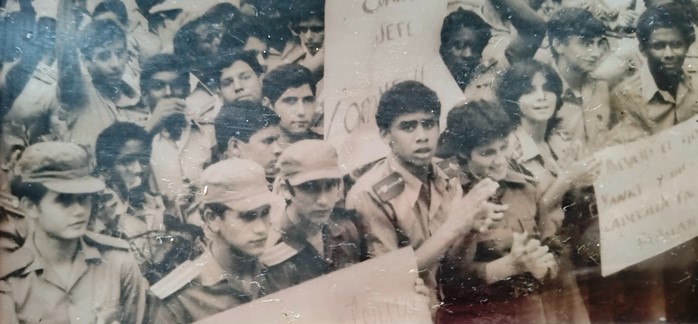
Someone who also struck a deep chord with him was the math teacher.
«I was as bad at this subject as I am at remembering names. This was a thin, lanky man, like a bamboo stick bent in the wind, who managed to introduce the knowledge I needed to get me through the last two years of high school. Of course, he did it outside of school hours, taking time out of his break to dedicate to me. I am still grateful for his efforts.
«The city of Matanzas was a shelter in the skin of my uncle, who treated me with tenderness, both the city and him. Such was his concern that he behaved as someone very close, even though it was by going to study there and his commitment to Dad that led me to know him in depth.
«At first I saw him as a jailer, a sword of Damocles about to be unloaded on me, but, on the contrary, he was a phenomenal counselor, a magnanimous instructor of responsibilities and, moreover, very affectionate. For him, for my cousins and for Aunt Julia, I feel an enormous affection. They behaved like a real family.
«Matanceros, in general, treated me with warmth and affection; I never felt discrimination for not being a native, something I did experience in other places.»
And then his memories overflow: he mentions the juicer in front of the Parque de la Libertad, on the corner; the retreta of the Concert Band brightening up the atmosphere with some danzón; the restaurant-cafeteria of Peñas Altas and, of course, El Mamey beach.
A little further away, he alludes to Cárdenas and Lázaro López, his best friend, «Cardenense to the marrow», and his family, with whom he still, so many years later, maintains a beautiful relationship.
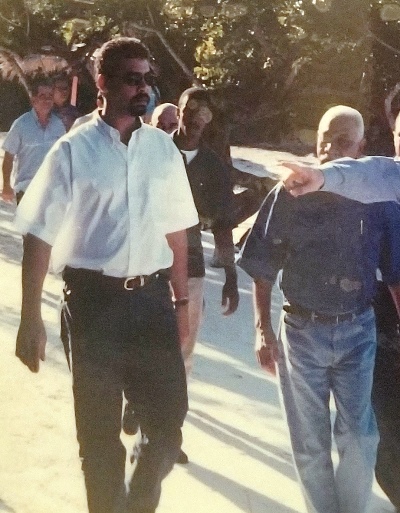
«I also ran many times through Limonar and Bolondrón in the company of this friend, when, escaped from the yoke of love imposed on me by that first love, we hunted for some new adventure. I don’t want to talk about the beauty of Varadero because it would be trite, but of its nightlife it is worth remembering the Rada and the Patana. In that seaside resort also lives the memory of my father teaching me to ski on the sea and the beloved days of diving, activities that we enjoyed as children.
«I tell you an anecdote related to that: my father’s passion for water skiing comes from the time of the beginning of the Revolution. That passion also left a dark mark on him. When he was doing that activity and was pulled by a helicopter from a jetty at the Tarará resort, the rope got tangled in his ring, tearing off the first phalanx of his left ring finger and that is why he disliked that garment. He only wore a watch and, for several years, a chain with his blood group, he said it was only out of necessity. Later, he only wore one watch, because he was the most punctual of the people I know».
Juan Antonio graduated with a degree in Criminal Sciences from the Superior School of Counter Intelligence Hermanos Martínez Tamayo.
«Almost at the end of the Camilitos I took aptitude tests for fighter pilots. I was already liking that life, but the first time I was ‘ironed out’. Later, my colleagues from Counterintelligence showed up, illustrating the importance of their performance. I fell in love with that career, I fought tooth and nail to be admitted, I took all the tests and, in my opinion, I had fulfilled the requirements, but that was left on tenterhooks; I did not hear any more about the admission or that any recruitment was being done in this regard.
«I finished my studies and nothing that was offered as study options caught my attention. I returned to Havana and, to my surprise, at the end of August, a girl from the recruitment agency appeared at the door of my house to inform me that my application for studies at the Higher School of the MININT had been approved. It was a moment of great joy.
«I finished my bachelor’s degree, but fate took me to the Police, where I worked as a police instructor until I realized that that was not my destiny, which led me to graduate. Three years later, I returned to civilian life as my own father’s executive assistant, which, more than a job, was a school, even more important than the University itself».
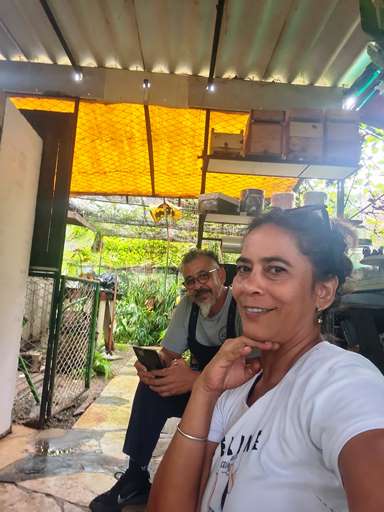
But, unexpectedly…, Juan Antonio turned his life around and today he has a point of sale that belongs to the Credit and Service Cooperative (CCS) strengthened by Aridez Estévez Sánchez, the only one in the municipality of Playa. Of course I want to know what was the origin of that change.
«How did the passion for agriculture get inculcated in me…? Well, I tell you that being an executive assistant in the State Council, as I mentioned, and as my father helped everyone in the family, he gave me the task of gathering the cousins, his brothers’ children, so that we could produce some land that existed around his house. We were in the middle of the special period.
«He told me to take the experience he had developed in the Combatant Associations throughout the country. Then, under his direction, we planted those lands with viands, beans and sunflowers, and with this last product I learned how to extract oil. This created an inertia that led me to do it on my own until I came to this place where I carry out my own project».
The strengthened CCS Arides Estévez Sánchez has a singular condition: it is located in the city, distributed in many small plots. There are more than 150 associates who grow various crops in small plots. Those who own more land are the cattle breeders, which border the periphery of the municipality, but are not very extensive. This cooperative is Vanguardia Nacional and fully complies with the social task, which is its main objective.
«In the neighborhood of Siboney, in an extension of 800 square meters, I have my small point of sale, of rustic construction, of tubes and tiles: Del Sol Floristería y Jardín. In its back space my wife and I grow various condiments such as oregano, rosemary, coriander, cilantro and aloe vera. Also some flowers like anthurium, heliconia and bird of paradise. It’s a small space, kind of like a big backyard.»
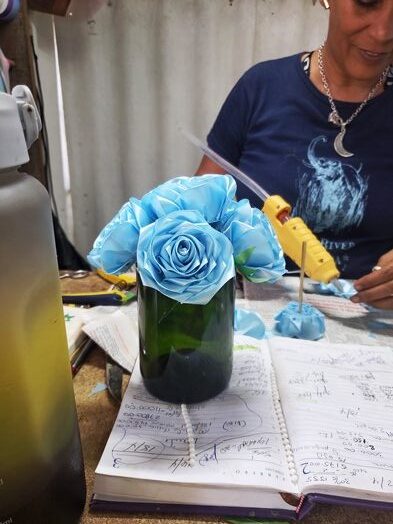
They started out as a flower shop, but wanted to do something with their own hands.
«That buying and selling is what a good portion of retailers do, but we wanted to make a difference. My wife, who is very intrepid and reckless, complicated things. So we started the project of making essential oils.»
They now produce blends of coconut oil as a base, combining it with the aforementioned seasonings in a maceration process. They also produce peanut, almond and walnut oils and are now working on castor oil. These products are destined for cosmetics and body care.
«Our marketing is mainly directed to the neighborhood. Production is small and demand exceeds supply because our production system is artisanal. We market the products in our own currency, making our tax contribution in due time and form. In spite of the times we live in, we are profitable. We are helped by a hired worker who performs, like us, any task we are asked to do».
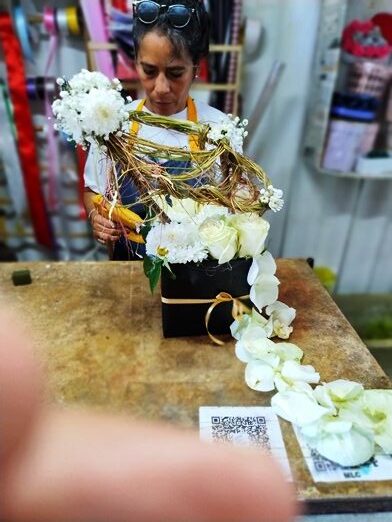
«I am the incumbent, although the management is horizontal, you know what it is like to work as a family, and I have my wife, not a wife, as God commands, although yes, but I must say she commands as God and there is a girl hired, as I explained.»
They say that the poetic and artistic edge is genetic in the Almeidas family and that it comes from great-grandfather Salvador…, that’s why I ask him, do you also write, make music, sing…?
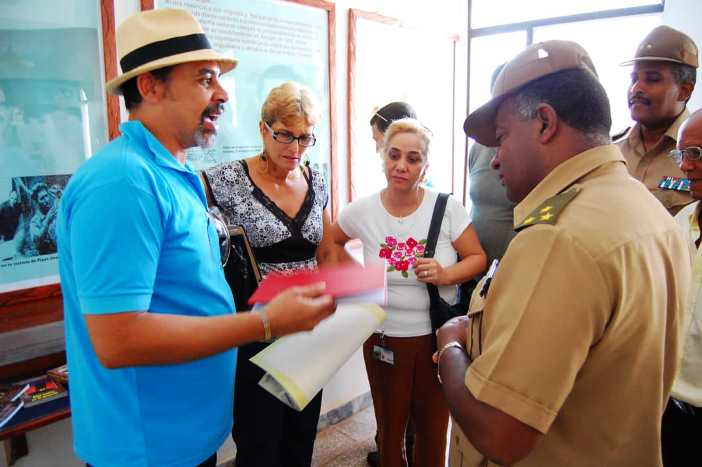
«Dad used to say that I have a cracked voice and he laughed when he said it. I don’t know what he meant by that, but I imagine it was because you could hear something like crystals bursting on the floor. And yes, it’s genetic: great-grandfather Salvador and dad are poets; grandfather Juanito, uncle Federico and uncle Eugenio, journalists; and aunt Charito, dad, Juan Guillermo and cousin Sunlay, in music. The latter is a prodigy in that science: concert pianist, teacher and composer. She also has great achievements at the international level. And my sister Diana Teresa is a painter, graduated from the San Alejandro Academy.
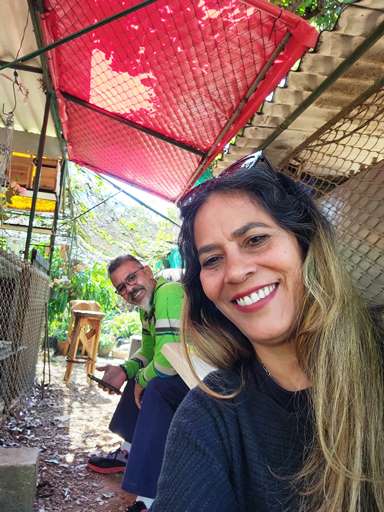
As the son of a military man like Juan Almeida, with such a committed life, I wanted him to tell me if he was ever afraid of what would happen to his father and also to tell me about the most beautiful moment he lived with him. I know there must have been many, but I asked her to dwell on the first thing she remembers when she thinks of him.
«While I was growing up, the fear of losing him never appeared, maybe because I never imagined a life without him. I also believed he was going to be eternal; I believed him to be infallible. My father was a brave man and did not feel weakness in the face of injustice. He was capable of abandoning the thin circle of protection he had, of only an escort and a chauffeur, to throw himself into protecting or intervening in a situation that demanded care. Later, the fear of losing him did appear, when I became aware of the existence of death. Although that was much later, when I saw his suffering when he lost his father. That was a very hard blow for him and for everyone, including his mother.
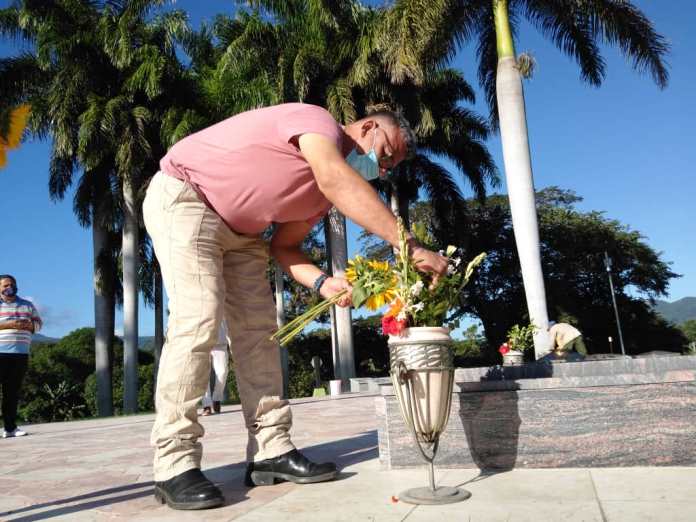
«The most beautiful moment is a mixture of several moments. Remember that we lived alone in Santiago de Cuba. Two of my sisters had been born, the jimaguas Berta Rosario and Rosario Berta, and my mother was carrying the weight of the three of them. To alleviate this, my father decided to take me with him to Santiago and we only came to Havana every other weekend.
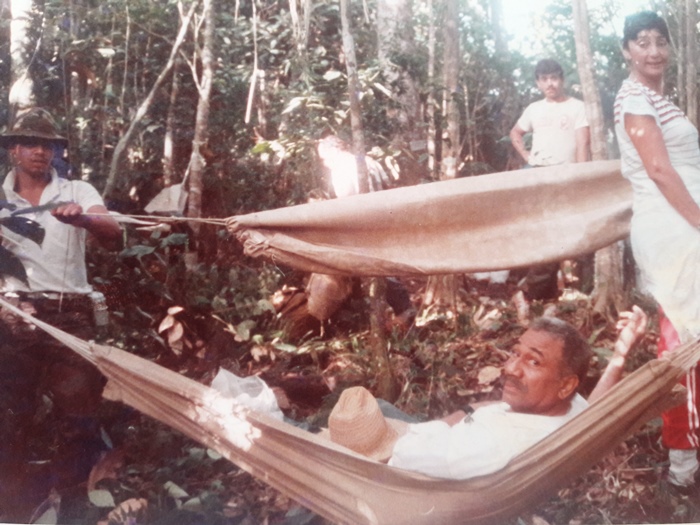
«This time forged our union and he filled every sentimental space that could cause the separation from my mother, who is as important to me as he is. That moment in a child’s life is marked by shortcomings and I can tell you that I had none. It is difficult for a child to remember the stage before the age of five, but my father needed me to grow up and he prepared me for many things in life at that time and from that young age. A stage I remember very fondly.
«When I was only five years old, in the bay of Santiago, he taught me to swim; also in Santiago he taught me to drive. In adolescence, he taught me to compose a song and to build a wall, remember that he was a bricklayer and very good. When there began to be worries about love, he was there to give me the crudest advice. So, Maritza, I can tell you that the most beautiful moment I lived next to my father was all my life; even now, when physically he is not by my side, spiritually he is. I take the time to remember every moment, every word, every gesture. As in a book, I go through each page of my life in which I have triumphed or lost, and he is there in all of them; he is there as he always was, to give me encouragement or to transfer the experience of his actions».
Does Juan Antonio resemble Juan Almeida Bosque, not physically, but emotionally, in his attitude towards life?
«Yes, very much. We are practical and detached, sensitive and in love, passionate and committed.
«Here I leave you a poem of mine that inspired me the action of the firemen in Supertanqueros.»
Mariposas
Mariposas de masa encarnadas
sobrevuelan por el pasto quemado.
Trémulas, habrán reaccionado
al horror que las tiene atrapadas.
Una llama violenta e hilarante
las gobierna, apretándose en sus alas;
mas de un barco bajaron cigalas
y palomas en vuelo apremiante.
Mas no fueron del todo veloces
cuando el monstruo avivó su bravura;
no secaron el mar con locura
ni crecieron sin talla las voces.
Al vaivén de su fin, más gloriosas,
perfumadas del aire viciado,
se dejaron llevar sin enfado
como van en cuaresmas las rosas.
Written by Maritza Tejera.


